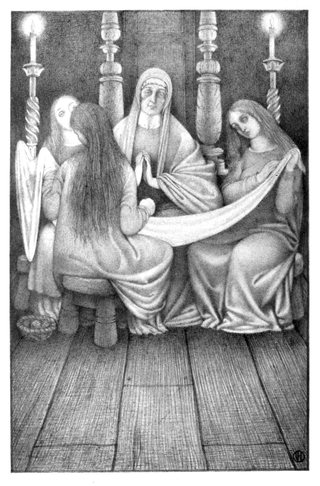Related Research Articles
Sir Aldingar is an English-language folk song. Francis James Child collected three variants, two fragmentary, in The English and Scottish Popular Ballads. All three recount the tale where a rebuffed Sir Aldingar slanders his mistress, Queen Eleanor, and a miraculous champion saves her.
"The Laily Worm and the Machrel of the Sea" is an English-language folk song. 'Machrel' is an archaic spelling of 'mackerel', the type of fish, and title can be spelled either way.

"Hind Horn" is a traditional English and Scottish folk ballad.
"Hind Etin" is a folk ballad existing in several variants.
Fair Annie is a traditional folk ballad, existing in several variants.

"Lord Thomas and Fair Annet", also known as "Lord Thomas and Fair Eleanor", is an English folk ballad.
The Gay Goshawk is a traditional English-language folk ballad.
Burd Ellen and Young Tamlane is a traditional English-language folk song. Despite similarity in names, it appears to have no connection with Tam Lin, nor with the tale of Childe Rowland, though they both have characters named Burd Ellen; indeed, Francis James Child was unable to connect this ballad with any other tradition or ballad.
"The Fair Flower of Northumberland" is a folk ballad.
Leesome Brand is an English-language folk song.

Fause Foodrage is a Scottish murder ballad of the 17th or 18th century. It was first printed by Walter Scott in Minstrelsy of the Scottish Border (1802). Scott cited Elizabeth, Lady Wardlaw as the ballad's probable author.
"Gil Brenton" is an English-language folk song, existing in several variants.
"Erlinton" is an English-language folk ballad. One variant features Robin Hood, but this variant forces the folk hero into a ballad structure where he does not fit naturally.
"Earl Brand" is a pseudo-historical English ballad.
"Young Andrew" is a folk song catalogued as Child ballad 48.
Sweet William's Ghost is an English ballad and folk song which exists in many lyrical variations and musical arrangements. Early known printings of the song include Allan Ramsay's The Tea-Table Miscellany in 1740 and Thomas Percy's Reliques of Ancient English Poetry in 1765. Percy believed that the last two stanzas of the version he published were later additions, but that the details of the story they recounted were original.
Clerk Saunders is an English-language folk song, likely originating somewhere in England or Scotland. It exists in several variants.

Sir Cawline is a traditional English-language folk song. A fragmentary form exists in The Percy Folio.
"Brown Robyn's Confession" is an English-language folk song.
"Proud Lady Margaret" is an English-language folk song.
References
- ↑ Francis James Child, English and Scottish Popular Ballads, "Child Waters"
- ↑ Francis James Child, The English and Scottish Popular Ballads, v 2, p 84, Dover Publications, New York 1965
- ↑ Francis James Child, The English and Scottish Popular Ballads, v 2, p 458, Dover Publications, New York 1965